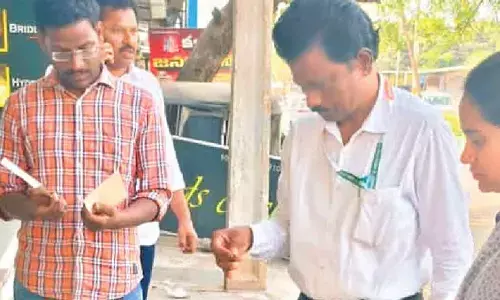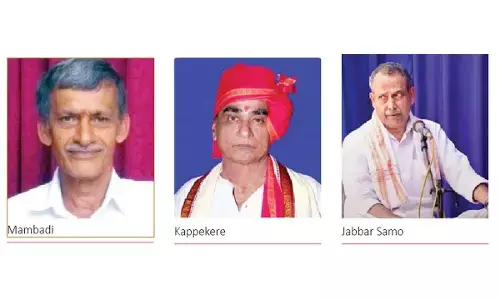Emotional moment of school-leaving students
Emotional moment of school-leaving students, Chukka Ramaiah, Emotional moment in student’s life. It is true that the marks or grades in tenth alone do not judge or prove one’s personality and success in life as talents differ and while some may shine here, others may shine at some other stage or in some other aspect.
School leaving is a very emotional moment in every student’s life. The memories it evokes, the sentiments they have towards not just their favorite teachers but with every bench, every classroom, playground and even the trees around have only to be felt to be accepted. This stage is almost like the dividing line between childhood and adolescence. Apart from these fond memories and partings, the certificate they earn, is like their passport to their future. It becomes an essential component in everything they do in their careers later. A few may know it in time to make a mark, a few others may not have the realisation of its importance at that time and some may not have the necessary support to prove themselves despite their inclination.
It is true that the marks or grades in tenth alone do not judge or prove one’s personality and success in life as talents differ and while some may shine here, others may shine at some other stage or in some other aspect. However, seeing the lakhs of enthusiastic youngsters from all corners of our state gearing themselves up for the big event, I wish to suggest some measures to bring equity here so as to make the school leaving certificates of students from the rural schools and marginalised sections as good as those of the learners from the privileged sections.
This year, approximately 12, 26,470 are taking the tenth examination of which 6, 61,160 are boys. The government must be congratulated for making extensive arrangements for this huge exercise in 4,924 regular centers and 734 private centers, involving the services of more than 21,000 teachers.
The media also has been pro-active in providing timely counselling to overcome examination stress, telling the need for proper planning and time management, being available online for clearing the academic doubts through their expert teams and so on. I only wish that adequate care be taken right from the stage where proper foundation is laid and not just at the final stages. My visit to the month-long camps being run in Warangal and Mahabubnagar districts under the supervision of the district collector, for the students about to write their tenth class examination, to provide a healthy academic environment to the first generation learners from government schools, set me thinking on many steps we need to take to maintain quality in our school education.
Our mid-day meal scheme is a success in reducing the dropout rate and retaining the learners in schools. Similarly, such special camps, as the ones I visited in Warangal, can be organised in Anantapur, Srikakulam and other districts too, wherever the socio-economic background is poor and the students need academic support. When parents are illiterate, they cannot help the child in his studies, nor can they understand the environment and nutrition necessary to make him prepare well for the common challenge ahead. The first generation learners, the average and below average students from the marginalised sections, who hesitate to express their doubts for fear of being heckled at by their peers, are at sea if there are no such camps to provide proper nourishment, clarify their doubts and encourage them. Instead of starting centers for psychological counselling for those who face failure, disappointment and depression after their examination results are announced, it is healthy to prevent the root cause by offering timely academic guidance.
Evaluation, review and further action based on these two are healthy steps. I wish that our authorities, who have been releasing district-wise and school wise results so far, would provide subject- wise results too, so that we can know who is weak where and take steps accordingly. The teachers’ role in evaluation can never be over-emphasised. It is not a mere sheet of paper, one among a thousand such others, a teacher evaluates, but every answer sheet is a throbbing young heart and mind captured there. So, evaluation is not like counting votes or any other stereotyped clerical job. Along with being impartial, uncompromising in standards, the teachers need to pay attention to every answer sheet as if it were their own child’s.
Changing with the moving times is always welcome. But, we need to be careful not to become weak and directionless by merely moving along without necessary preparedness. Examinations, the pattern in which they are held and their importance in evaluation have been changing the world over. Many countries have done away with the year-end examination as a criterion for evaluation. But before doing away with the common examination system, they have worked hard at every level to develop a system of conceptual education so that the standards would not be compromised. What about us? Earlier we had a common examination in class 7 and now we don’t. Subsequently, we have students reaching class 10 even without being able to read the alphabet correctly. This is a collapse of the system for which our short sightedness alone is responsible. The disparity born from unequal schooling in the primary classes grows into an unbridgeable chasm by the time the slow learner reaches the tenth class, for he has not been paid the needed personal care and attention, has mostly been neglected in a class where the teacher mainly targets the average learner. Let us analyse our situation, take necessary steps to build conceptual understanding from the base onwards and then consider any radical changes.
From the coming academic year, the tenth class students are going to read a new set of textbooks designed to enhance their skills in all aspects. So, it surely calls for better advanced preparation by the teachers in setting their new goals, undergoing necessary training and serving the confused learners better by boosting their confidence through student-centric methods of learning and paying attention to the slow learners’ needs in a better way than in the past.
(The writer is noted educationist and











